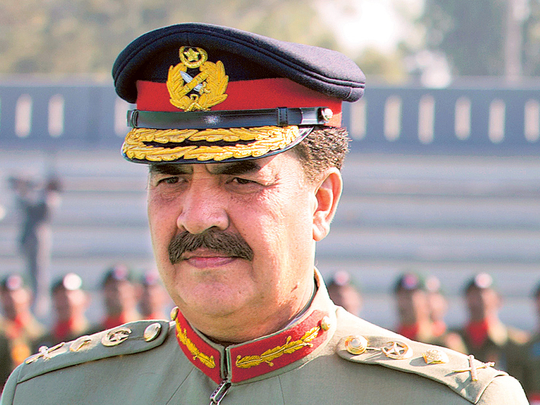
Dubai: Nominated last November by Pakistan Prime Minister Nawaz Sharif, largely on the assertion that he was a low-profile general, following his previous and disastrous appointment of General Pervez Musharraf, which resulted in Sharif being removed in a coup, General Raheel Sharif (no relation to the prime minister) suddenly finds himself at the forefront of Pakistan politics having the responsibility of taking key decisions to sort out a political stalemate.
General Sharif’s predecessor Ashfaq Parvez Kayani, also a former spymaster, was a contrast in terms of personality to Musharraf from whom he took over. To his credit, Kayani succeeded in keeping the army away from politics and showed a greater tolerance for criticism from various quarters.
Current developments in Pakistan seem to suggest that a direct involvement by the army in governing the state perhaps cannot be ruled out, given that the prime minister has run out of viable options.
This is why General Sharif could be entrusted with the responsibility of having to play the prime minister’s role and avoid political instability, though reports seem to suggest that the prime minister has denied approaching the army chief for a solution and assistance.
The wheel of fortune for the Pakistan army keeps coming full circle as time and again they are sucked into mainstream politics and governance of the masses. Most experts argue that their journey back into the seat of power is self choreographed. The general’s administrative and political skills will now be scrutinised, not just by the people but also by the international fraternity.
If there is credence in the analysis of the various experts who have been monitoring the currently developments in Pakistan then it could also be possible that the army has been orchestrating the current developments in a deliberate attempt to unseat the government and then maybe sideline the prime minister and his cabinet for failing to act convincingly on security and foreign policy issues.
If the current events are any indication then it does appear that Nawaz Sharif’s position has been weakened over the past few days. His approach to the army, virtually asking them to play the role that he and his cabinet should have played, supports this argument.
Time, and developments, will indicate if General Sharif harbours any grand ambitions. In any event, the post of army chief is a powerful one in Pakistan’s political scenario given that the country has repeatedly swung between rule by a democratically elected government and the military for the past 60 years.
The current impasse between the government and the protesters takes on a serious complexion given that promises made have not been fulfilled, Pakistan’s economy is in free fall, there is an energy crisis and the security forces are grappling with an extremist problem as well as sectarian tension.
Ironically, however, the stock markets recorded a surge when news filtered out to the media that Nawaz Sharif had approached the armed forces for assistance. The broadcast was strategically done — the army’s press wing sent out a tweet saying that General Raheel Sharif would meet both opposition leaders late on Thursday. No other comment was available after that.
Was this tactic more in keeping with General Sharif’s quiet personality, or does it reflect the personality of a shrewd tactician?
Analysts suggest that the army chief is “known more as a military man. He doesn’t speak publicly.” Apparently, this was the sole quality that Nawaz Sharif had looked for before appointing the general — that the army stayed exclusively within the boundaries of its functions.
Sharif knows what is at stake if the current scenario backfires on him: another possible stint in the political wilderness cannot be ruled out, given that he now faces allegations that range from criminal charges, including murder, and having failed to govern the state after coming to power through fraudulent means.
General Sharif also has his priorities cut out — conducting a successful campaign to thwart the designs of terrorists internally, avoid sectarian conflicts, managing his country’s military role in the ongoing offensive against the Taliban in Afghanistan and maintaining stability along the border with neighbours India with whom Pakistan has shared a turbulent relationship, on multiple platforms, since both countries gained independence in 1947.
On Friday, Pakistan’s interior minister said that the intransigence of anti-government movements had left no alternative but a mediation by the army to end the two-week political crisis. Having been named as the mediator, is this the first of the several big steps that General Sharif is going to have to take?
The Prime Minister’s cabinet has had its foundations shaken. “When a group or two parties has no faith in the judiciary, the opposition, lawyers, or civil society and has no confidence in anybody, what option remains for the government?” said interior minister Chaudhry Ali Nisar.
A solution negotiated by the army would lend credibility to the view, held by many analysts, that the armed forces and its intelligence agencies have been providing support to prop up the people’s protests initiated by Imran and Qadri. Sharif may survive, but barely just, and the possibility of having to make huge concessions to the military cannot be ruled out in exchange for support to survive.












